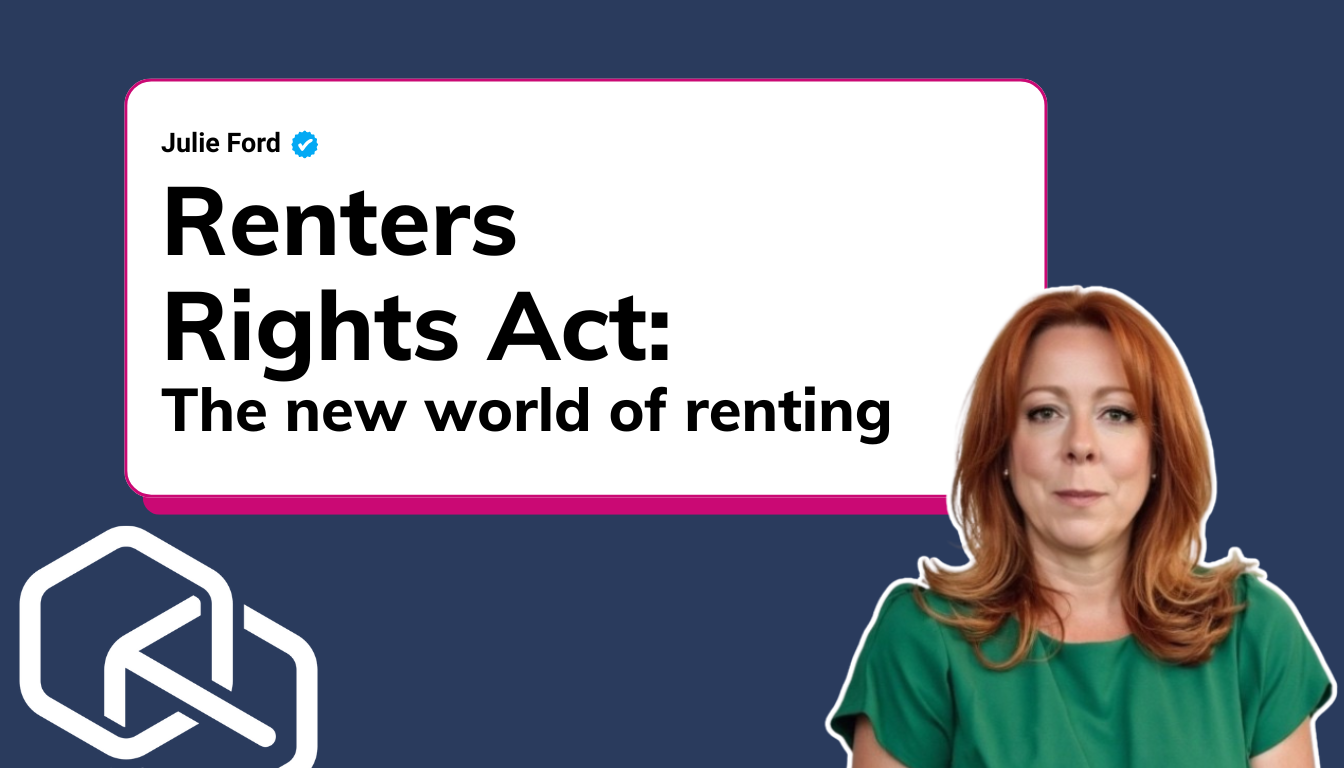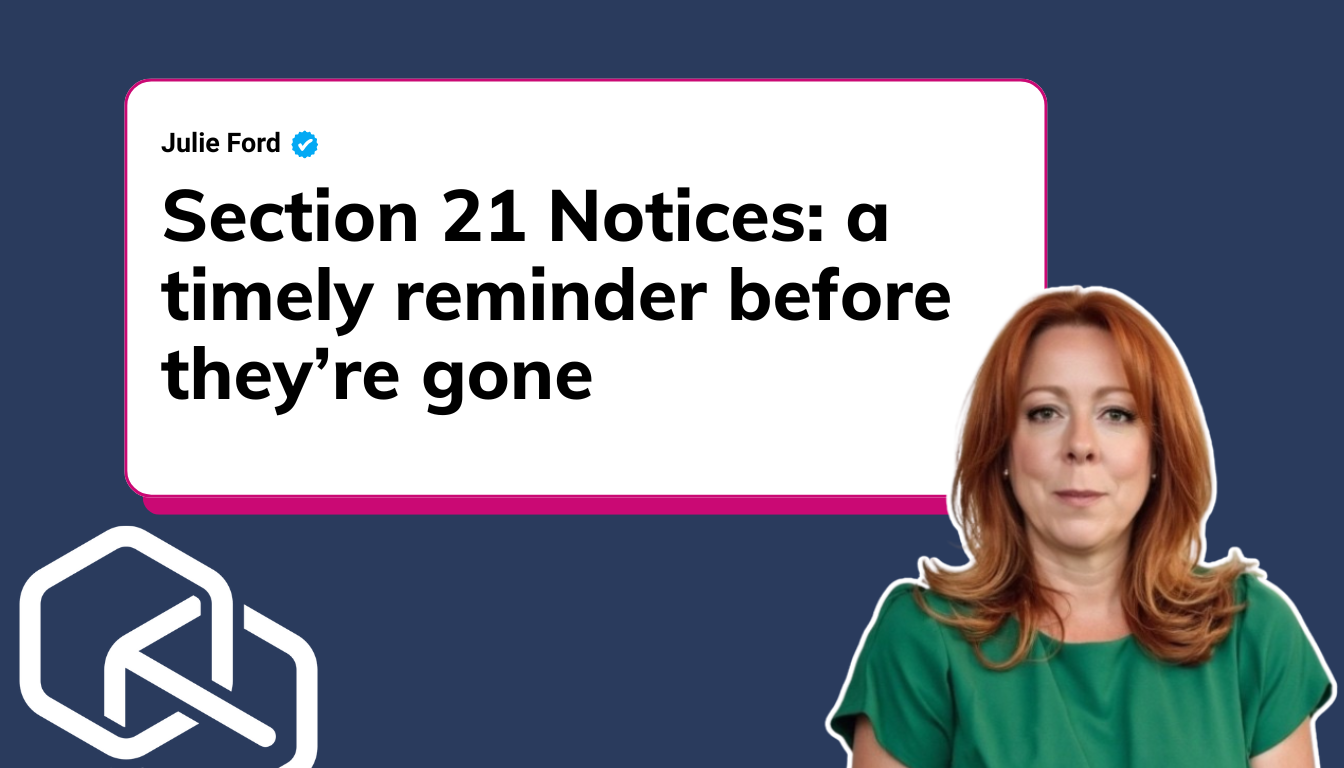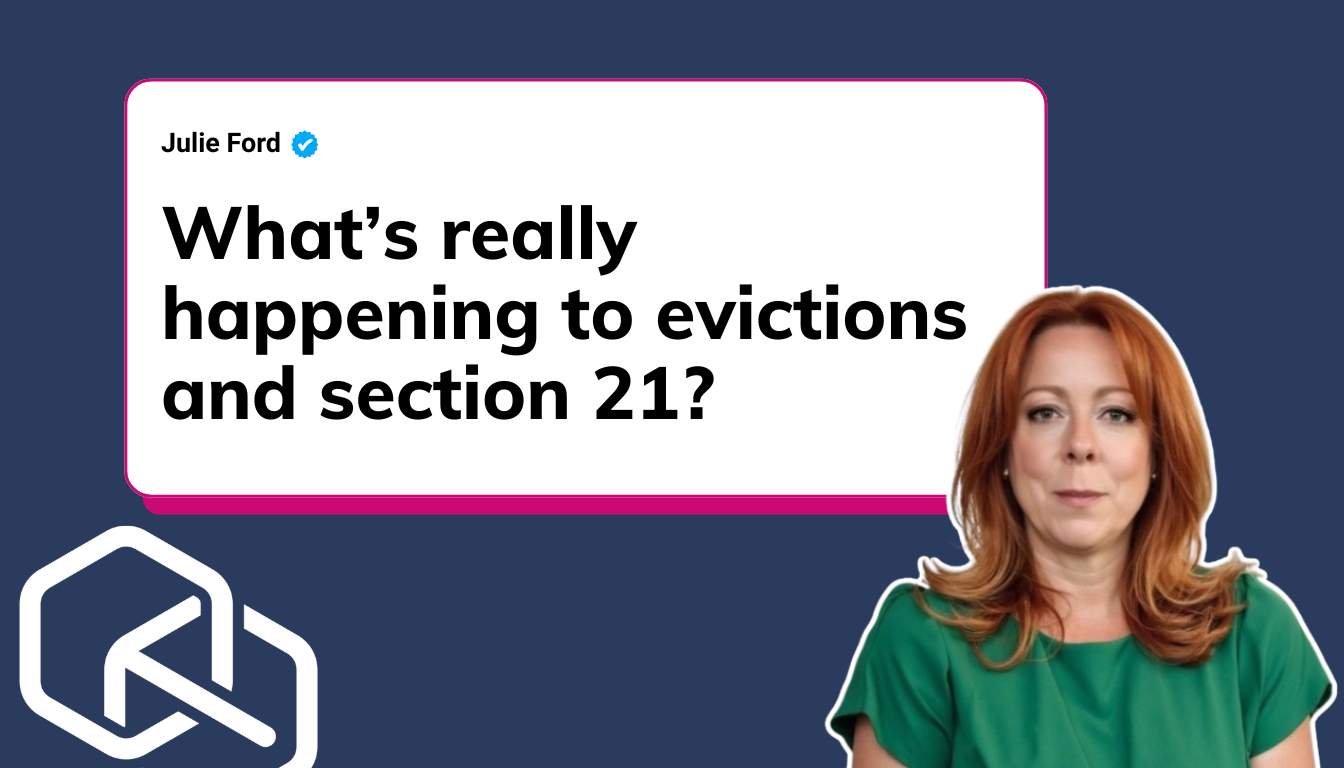This is a live blog, updated as changes happen.
The Renters’ Rights Act has now received Royal Assent. It’s the biggest shift in rental law for more than 30 years and will change how we all let, manage and increase rents across England.
It aims to make renting safer, more affordable and more secure, but the reality is that it will take some getting used to. For property managers, preparation will be key.
Here’s everything covered in the recent webinar on the Renters’ Rights Act, including the most common questions answered live.
Key milestones
- The Bill has passed through the House of Commons and the House of Lords.
- Royal Assent was granted on 27 October.
- Councils gain new powers under the Act on 27 December.
- The main legislation is to commence from 1st May 2026.
Removal of Section 21 and fixed term tenancies
- Section 21 and fixed term assured short hold tenancies will be removed.
- Section 21, known as the “no-fault” notice, will no longer exist.
- Fixed terms will disappear, meaning no end dates on tenancies.
- Tenancies will be periodic from day one.
- A tenancy can only end if the tenant serves notice or the landlord obtains a court order.
If a fixed-term tenancy is already in place when the Act starts, it will convert automatically to a periodic tenancy on commencement, regardless of how long was left.
Some landlords have been trying to tie tenants into longer contracts before the law begins, but those fixed terms will end as soon as the Act is live.
This also means that property managers will need to understand their tenants in a lot more depth. With the ability to give two months’ notice at any time, even on the day they move in, referencing can’t just be about income or credit history anymore. It’s about knowing people. Having real conversations about their lifestyle, long-term plans, and where they see themselves in five years will help reduce turnover and give both sides more stability.
Rent in advance
Rent in advance will be outlawed.
- Only the first month’s rent can be taken, and only after the tenancy agreement has been signed.
- Holding deposits and security deposits remain unaffected.
- You cannot ask for several months of rent up front, even for students or tenants who do not meet standard referencing.
If a tenant signs the agreement but fails to pay the first month’s rent, occupation must still be allowed because a legal tenancy has been created.
A tenant can later choose to put their account into credit voluntarily, but it cannot be required or written into the agreement.
Any rent already taken in advance before the Act starts will continue as normal until that term ends.
Tenant notice and “one out, all out”
- Tenants will be able to serve two months’ notice at any time, even on the day they move in, although in practice that is likely to be unusual.
With the new periodic tenancies, joint tenancies work very differently:
- In a joint tenancy, one tenant’s notice ends the tenancy for everyone.
- That applies even if the other tenants do not know about the notice or do not agree with it.
- If you have, for example, five tenants on a joint tenancy and one decides to leave, their notice legally ends the tenancy for all five.
What happens next:
- Once that two months’ notice expires, you then renegotiate with the remaining occupiers and sign them up to a brand new tenancy.
- There is nothing to “roll on” because the original tenancy has ended.
- Technically, if they stay in the property without a new agreement in place, they are trespassers in the eyes of the law, even if you are happy for them to be there and paying rent.
On trying to force someone out via the courts:
- You will not be able to use Section 21, because it will no longer exist.
- There is no clear Section 8 ground that applies simply because a joint tenant has served notice and another wants to stay.
Because of that, the focus is on managing behaviour and expectations around the notice period:
- In your acknowledgement of a tenant’s notice, you can add a line explaining that if they stay beyond the date they have given, you will charge double rent on a daily rate under section 18 of the Distress for Rent Act 1757.
- That law is still in force and is commonly used to push overstayers to leave on time.
On cancelling notice:
- Once a tenant serves notice, it cannot be unilaterally revoked.
- The only way to cancel it is by mutual agreement, where both landlord and tenant confirm they are happy for the notice to be withdrawn and the tenancy to continue.
HMOs, room-only tenancies and students
The “one out, all out” rule also applies to joint tenancies in HMOs. Joint tenants can legally exclude a landlord from the property, even from communal areas, which conflicts with HMO licensing that requires regular inspections and access for maintenance.
Because of that, joint tenancies are likely to become more complicated and high-maintenance. Every time one tenant leaves, a new tenancy will need to be created for everyone else.
Room-only tenancies are far easier to manage. They give landlords and managers flexibility when tenants move in and out at different times and avoid disruption to the rest of the household.
For student lets, the new system will be particularly difficult. Periodic tenancies don’t align well with fixed academic years, and early departures could create more administration, voids and uncertainty for property managers.
Rent-to-rent and guaranteed rent
The Act overturns the Racusum v Jepsen High Court ruling. If a rent-to-rent operator fails to comply, such as by not obtaining an HMO licence, the tenant will now be able to pursue the property owner directly, even if that owner has had no contact with the tenant.
Rent-to-rent and guaranteed rent models will otherwise continue but must meet the same compliance rules as everyone else.
The landlord database
The national landlord database will not go live immediately.
- It is currently in beta testing with three northern councils.
- It is expected to arrive between 2026 and 2028.
- Every landlord will need to enter their personal details, including name, address, phone number and email, even when using an agent.
- The database will also hold safety certificates, HMO licences and any property-related offences or fines.
- It is currently written as a public database, although this could change.
Landlords will receive a unique database number that must appear on every property listing.
Fines for failing to join or for inaccurate information will start at £7,000 and can reach £40,000.
The new Ombudsman for landlords
A new Private Landlord Ombudsman will be introduced.
- It is separate from the redress schemes that agents already use.
- The Housing Ombudsman is expected to run it.
- Landlords will have to join both the database and the Ombudsman to advertise or evict.
- Those who are not members can only evict using the two antisocial behaviour grounds (7A and 14).
The estimated annual cost will be £10 to £30 per property, though this is still under review.
Renting with pets
Accepting pets becomes an implied term in every tenancy.
Landlords can still refuse, but only for a reasonable reason, for example:
- The property is an HMO.
- There are welfare concerns, such as a large dog in a studio flat.
- A superior lease forbids pets.
- Religious grounds if the landlord plans to move back in immediately.
Tenants must request pets in writing with full details, and landlords have 28 days to reply.
There will be no extra pet deposit or mandatory insurance. Damage can only be claimed from the standard five-week deposit or, if higher, through Money Claim Online.
If a tenant keeps a pet without permission, that is a breach of contract under Ground 12, but eviction on that ground is discretionary and may depend on the judge’s view.
Rent increases and appeals
Under the Act, rent can only be increased by serving a Section 13 Notice.
- Two months’ notice will be required.
- Rent can only be increased once a year.
- All rent review clauses and CPI-linked uplifts in existing agreements will become invalid once the Act starts.
Tenants will be able to challenge rent levels at the First-tier Tribunal (Property Chamber) either:
- Within six months of moving in if they believe the starting rent is above market level, or
- When served with a rent increase.
While an appeal is in progress, tenants must keep paying rent at the current rate. The tribunal’s decision sets the new rent from the decision date and it will not be backdated.
In 2024, around 900 rent appeals were made, each taking about eight months to decide. The Act allows the Secretary of State to reintroduce backdating later if tribunal backlogs become excessive.
Tenants do not pay to appeal. If a landlord disagrees with a tribunal decision, they have 28 days to appeal.
Written statements for existing tenants
When the Act begins, landlords will not need to issue new contracts. Instead, within one month of commencement, each tenant must be given a government-issued written statement summarising the new law. Failing to provide it could lead to a fine.
Questions
Q: When is the last day to serve a Section 21?
A: Up to 4:30 pm on the day before the Act starts.
Q: Can a tenant cancel notice?
A: Only with mutual agreement.
Q: What if one joint tenant wants to stay?
A: The tenancy ends for all and a new one must be signed.
Q: Can tenants be made to find replacements?
A: No. Their notice ends the whole tenancy.
Q: Can landlords refuse pets in HMOs?
A: Yes, that is a reasonable reason.
Q: Can an extra pet deposit be charged?
A: No.
Q: Can utilities be increased separately from rent?
A: Yes, but landlords cannot profit under the Resale of Fuel Act 1952.
Q: Do OpenRent landlords need to join the database and Ombudsman?
A: Yes, the requirement applies to everyone advertising in England.
Q: Is there a cost for tenants to appeal rent?
A: No, it is free.
Q: How soon must the written statement be issued?
A: Within one month of the Act starting.
The Renters’ Rights Act will completely reshape how property management works in England. With fines starting at £7,000 and new digital systems for compliance, the best approach is to prepare now.
Every tenancy, every advert, every rent increase will be affected. The managers and agents who understand the changes early will save themselves time, stress and money when the new rules come into force.
This is a live blog, updated as changes happen.
The Renters’ Rights Act has now received Royal Assent. It’s the biggest shift in rental law for more than 30 years and will change how we all let, manage and increase rents across England.
It aims to make renting safer, more affordable and more secure, but the reality is that it will take some getting used to. For property managers, preparation will be key.
Here’s everything covered in the recent webinar on the Renters’ Rights Act, including the most common questions answered live.
Key milestones
- The Bill has passed through the House of Commons and the House of Lords.
- Royal Assent was granted on 27 October.
- Councils gain new powers under the Act on 27 December.
- The main legislation is to commence from 1st May 2026.
Removal of Section 21 and fixed term tenancies
- Section 21 and fixed term assured short hold tenancies will be removed.
- Section 21, known as the “no-fault” notice, will no longer exist.
- Fixed terms will disappear, meaning no end dates on tenancies.
- Tenancies will be periodic from day one.
- A tenancy can only end if the tenant serves notice or the landlord obtains a court order.
If a fixed-term tenancy is already in place when the Act starts, it will convert automatically to a periodic tenancy on commencement, regardless of how long was left.
Some landlords have been trying to tie tenants into longer contracts before the law begins, but those fixed terms will end as soon as the Act is live.
This also means that property managers will need to understand their tenants in a lot more depth. With the ability to give two months’ notice at any time, even on the day they move in, referencing can’t just be about income or credit history anymore. It’s about knowing people. Having real conversations about their lifestyle, long-term plans, and where they see themselves in five years will help reduce turnover and give both sides more stability.
Rent in advance
Rent in advance will be outlawed.
- Only the first month’s rent can be taken, and only after the tenancy agreement has been signed.
- Holding deposits and security deposits remain unaffected.
- You cannot ask for several months of rent up front, even for students or tenants who do not meet standard referencing.
If a tenant signs the agreement but fails to pay the first month’s rent, occupation must still be allowed because a legal tenancy has been created.
A tenant can later choose to put their account into credit voluntarily, but it cannot be required or written into the agreement.
Any rent already taken in advance before the Act starts will continue as normal until that term ends.
Tenant notice and “one out, all out”
- Tenants will be able to serve two months’ notice at any time, even on the day they move in, although in practice that is likely to be unusual.
With the new periodic tenancies, joint tenancies work very differently:
- In a joint tenancy, one tenant’s notice ends the tenancy for everyone.
- That applies even if the other tenants do not know about the notice or do not agree with it.
- If you have, for example, five tenants on a joint tenancy and one decides to leave, their notice legally ends the tenancy for all five.
What happens next:
- Once that two months’ notice expires, you then renegotiate with the remaining occupiers and sign them up to a brand new tenancy.
- There is nothing to “roll on” because the original tenancy has ended.
- Technically, if they stay in the property without a new agreement in place, they are trespassers in the eyes of the law, even if you are happy for them to be there and paying rent.
On trying to force someone out via the courts:
- You will not be able to use Section 21, because it will no longer exist.
- There is no clear Section 8 ground that applies simply because a joint tenant has served notice and another wants to stay.
Because of that, the focus is on managing behaviour and expectations around the notice period:
- In your acknowledgement of a tenant’s notice, you can add a line explaining that if they stay beyond the date they have given, you will charge double rent on a daily rate under section 18 of the Distress for Rent Act 1757.
- That law is still in force and is commonly used to push overstayers to leave on time.
On cancelling notice:
- Once a tenant serves notice, it cannot be unilaterally revoked.
- The only way to cancel it is by mutual agreement, where both landlord and tenant confirm they are happy for the notice to be withdrawn and the tenancy to continue.
HMOs, room-only tenancies and students
The “one out, all out” rule also applies to joint tenancies in HMOs. Joint tenants can legally exclude a landlord from the property, even from communal areas, which conflicts with HMO licensing that requires regular inspections and access for maintenance.
Because of that, joint tenancies are likely to become more complicated and high-maintenance. Every time one tenant leaves, a new tenancy will need to be created for everyone else.
Room-only tenancies are far easier to manage. They give landlords and managers flexibility when tenants move in and out at different times and avoid disruption to the rest of the household.
For student lets, the new system will be particularly difficult. Periodic tenancies don’t align well with fixed academic years, and early departures could create more administration, voids and uncertainty for property managers.
Rent-to-rent and guaranteed rent
The Act overturns the Racusum v Jepsen High Court ruling. If a rent-to-rent operator fails to comply, such as by not obtaining an HMO licence, the tenant will now be able to pursue the property owner directly, even if that owner has had no contact with the tenant.
Rent-to-rent and guaranteed rent models will otherwise continue but must meet the same compliance rules as everyone else.
The landlord database
The national landlord database will not go live immediately.
- It is currently in beta testing with three northern councils.
- It is expected to arrive between 2026 and 2028.
- Every landlord will need to enter their personal details, including name, address, phone number and email, even when using an agent.
- The database will also hold safety certificates, HMO licences and any property-related offences or fines.
- It is currently written as a public database, although this could change.
Landlords will receive a unique database number that must appear on every property listing.
Fines for failing to join or for inaccurate information will start at £7,000 and can reach £40,000.
The new Ombudsman for landlords
A new Private Landlord Ombudsman will be introduced.
- It is separate from the redress schemes that agents already use.
- The Housing Ombudsman is expected to run it.
- Landlords will have to join both the database and the Ombudsman to advertise or evict.
- Those who are not members can only evict using the two antisocial behaviour grounds (7A and 14).
The estimated annual cost will be £10 to £30 per property, though this is still under review.
Renting with pets
Accepting pets becomes an implied term in every tenancy.
Landlords can still refuse, but only for a reasonable reason, for example:
- The property is an HMO.
- There are welfare concerns, such as a large dog in a studio flat.
- A superior lease forbids pets.
- Religious grounds if the landlord plans to move back in immediately.
Tenants must request pets in writing with full details, and landlords have 28 days to reply.
There will be no extra pet deposit or mandatory insurance. Damage can only be claimed from the standard five-week deposit or, if higher, through Money Claim Online.
If a tenant keeps a pet without permission, that is a breach of contract under Ground 12, but eviction on that ground is discretionary and may depend on the judge’s view.
Rent increases and appeals
Under the Act, rent can only be increased by serving a Section 13 Notice.
- Two months’ notice will be required.
- Rent can only be increased once a year.
- All rent review clauses and CPI-linked uplifts in existing agreements will become invalid once the Act starts.
Tenants will be able to challenge rent levels at the First-tier Tribunal (Property Chamber) either:
- Within six months of moving in if they believe the starting rent is above market level, or
- When served with a rent increase.
While an appeal is in progress, tenants must keep paying rent at the current rate. The tribunal’s decision sets the new rent from the decision date and it will not be backdated.
In 2024, around 900 rent appeals were made, each taking about eight months to decide. The Act allows the Secretary of State to reintroduce backdating later if tribunal backlogs become excessive.
Tenants do not pay to appeal. If a landlord disagrees with a tribunal decision, they have 28 days to appeal.
Written statements for existing tenants
When the Act begins, landlords will not need to issue new contracts. Instead, within one month of commencement, each tenant must be given a government-issued written statement summarising the new law. Failing to provide it could lead to a fine.
Questions
Q: When is the last day to serve a Section 21?
A: Up to 4:30 pm on the day before the Act starts.
Q: Can a tenant cancel notice?
A: Only with mutual agreement.
Q: What if one joint tenant wants to stay?
A: The tenancy ends for all and a new one must be signed.
Q: Can tenants be made to find replacements?
A: No. Their notice ends the whole tenancy.
Q: Can landlords refuse pets in HMOs?
A: Yes, that is a reasonable reason.
Q: Can an extra pet deposit be charged?
A: No.
Q: Can utilities be increased separately from rent?
A: Yes, but landlords cannot profit under the Resale of Fuel Act 1952.
Q: Do OpenRent landlords need to join the database and Ombudsman?
A: Yes, the requirement applies to everyone advertising in England.
Q: Is there a cost for tenants to appeal rent?
A: No, it is free.
Q: How soon must the written statement be issued?
A: Within one month of the Act starting.
The Renters’ Rights Act will completely reshape how property management works in England. With fines starting at £7,000 and new digital systems for compliance, the best approach is to prepare now.
Every tenancy, every advert, every rent increase will be affected. The managers and agents who understand the changes early will save themselves time, stress and money when the new rules come into force.








